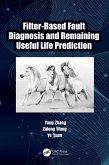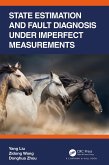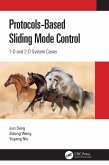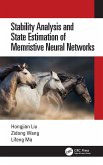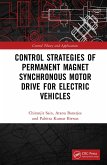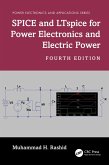Yong Zhang, Zidong Wang, Ye Yuan
Filter-Based Fault Diagnosis and Remaining Useful Life Prediction (eBook, ePUB)
48,95 €
48,95 €
inkl. MwSt.
Sofort per Download lieferbar

24 °P sammeln
48,95 €
Als Download kaufen

48,95 €
inkl. MwSt.
Sofort per Download lieferbar

24 °P sammeln
Jetzt verschenken
Alle Infos zum eBook verschenken
48,95 €
inkl. MwSt.
Sofort per Download lieferbar
Alle Infos zum eBook verschenken

24 °P sammeln
Yong Zhang, Zidong Wang, Ye Yuan
Filter-Based Fault Diagnosis and Remaining Useful Life Prediction (eBook, ePUB)
- Format: ePub
- Merkliste
- Auf die Merkliste
- Bewerten Bewerten
- Teilen
- Produkt teilen
- Produkterinnerung
- Produkterinnerung

Bitte loggen Sie sich zunächst in Ihr Kundenkonto ein oder registrieren Sie sich bei
bücher.de, um das eBook-Abo tolino select nutzen zu können.
Hier können Sie sich einloggen
Hier können Sie sich einloggen
Sie sind bereits eingeloggt. Klicken Sie auf 2. tolino select Abo, um fortzufahren.

Bitte loggen Sie sich zunächst in Ihr Kundenkonto ein oder registrieren Sie sich bei bücher.de, um das eBook-Abo tolino select nutzen zu können.
This book unifies existing and emerging concepts concerning state estimation, fault detection, fault isolation and fault estimation on industrial systems with an emphasis on a variety of network-induced phenomena, fault diagnosis and remaining useful life for industrial equipment.
- Geräte: eReader
- mit Kopierschutz
- eBook Hilfe
Andere Kunden interessierten sich auch für
![Filter-Based Fault Diagnosis and Remaining Useful Life Prediction (eBook, PDF) Filter-Based Fault Diagnosis and Remaining Useful Life Prediction (eBook, PDF)]() Yong ZhangFilter-Based Fault Diagnosis and Remaining Useful Life Prediction (eBook, PDF)48,95 €
Yong ZhangFilter-Based Fault Diagnosis and Remaining Useful Life Prediction (eBook, PDF)48,95 €![State Estimation and Fault Diagnosis under Imperfect Measurements (eBook, ePUB) State Estimation and Fault Diagnosis under Imperfect Measurements (eBook, ePUB)]() Yang LiuState Estimation and Fault Diagnosis under Imperfect Measurements (eBook, ePUB)48,95 €
Yang LiuState Estimation and Fault Diagnosis under Imperfect Measurements (eBook, ePUB)48,95 €![Protocol-Based Sliding Mode Control (eBook, ePUB) Protocol-Based Sliding Mode Control (eBook, ePUB)]() Jun SongProtocol-Based Sliding Mode Control (eBook, ePUB)58,95 €
Jun SongProtocol-Based Sliding Mode Control (eBook, ePUB)58,95 €![Stability Analysis and State Estimation of Memristive Neural Networks (eBook, ePUB) Stability Analysis and State Estimation of Memristive Neural Networks (eBook, ePUB)]() Hongjian LiuStability Analysis and State Estimation of Memristive Neural Networks (eBook, ePUB)48,95 €
Hongjian LiuStability Analysis and State Estimation of Memristive Neural Networks (eBook, ePUB)48,95 €![Control Strategies of Permanent Magnet Synchronous Motor Drive for Electric Vehicles (eBook, ePUB) Control Strategies of Permanent Magnet Synchronous Motor Drive for Electric Vehicles (eBook, ePUB)]() Chiranjit SainControl Strategies of Permanent Magnet Synchronous Motor Drive for Electric Vehicles (eBook, ePUB)59,95 €
Chiranjit SainControl Strategies of Permanent Magnet Synchronous Motor Drive for Electric Vehicles (eBook, ePUB)59,95 €![SPICE and LTspice for Power Electronics and Electric Power (eBook, ePUB) SPICE and LTspice for Power Electronics and Electric Power (eBook, ePUB)]() Muhammad H. RashidSPICE and LTspice for Power Electronics and Electric Power (eBook, ePUB)157,95 €
Muhammad H. RashidSPICE and LTspice for Power Electronics and Electric Power (eBook, ePUB)157,95 €![Smart Grids for Renewable Energy Systems, Electric Vehicles and Energy Storage Systems (eBook, ePUB) Smart Grids for Renewable Energy Systems, Electric Vehicles and Energy Storage Systems (eBook, ePUB)]() Smart Grids for Renewable Energy Systems, Electric Vehicles and Energy Storage Systems (eBook, ePUB)48,95 €
Smart Grids for Renewable Energy Systems, Electric Vehicles and Energy Storage Systems (eBook, ePUB)48,95 €-
-
-
This book unifies existing and emerging concepts concerning state estimation, fault detection, fault isolation and fault estimation on industrial systems with an emphasis on a variety of network-induced phenomena, fault diagnosis and remaining useful life for industrial equipment.
Dieser Download kann aus rechtlichen Gründen nur mit Rechnungsadresse in A, B, BG, CY, CZ, D, DK, EW, E, FIN, F, GR, HR, H, IRL, I, LT, L, LR, M, NL, PL, P, R, S, SLO, SK ausgeliefert werden.
Produktdetails
- Produktdetails
- Verlag: Taylor & Francis eBooks
- Seitenzahl: 290
- Erscheinungstermin: 10. Februar 2023
- Englisch
- ISBN-13: 9781000835960
- Artikelnr.: 67249486
- Verlag: Taylor & Francis eBooks
- Seitenzahl: 290
- Erscheinungstermin: 10. Februar 2023
- Englisch
- ISBN-13: 9781000835960
- Artikelnr.: 67249486
- Herstellerkennzeichnung Die Herstellerinformationen sind derzeit nicht verfügbar.
Yong Zhang is currently full Professor of Automatic Control, at School of Information Science and Engineering, Wuhan University of Science and Technology since 2019. Prior to this, he was a Post-doctoral researcher in the Control Science and Engineering, Wuhan University of Science and Technology. He received the B.Sc. degree in Mathematics Education in 2001 from Jiangsu Normal University, Xuzhou, China, the MSc degree in Applied Mathematics in 2007 from Three Gorges University, Yichang, China, and the Ph.D. degree in Control Science and Engineering in 2010 from Huazhong University of Science and Technology, Wuhan, China. From 2014 to 2015, he was a visitor with the Department of Information Systems and Computing, Brunel University London, Uxbridge, U.K. He has published over 30 papers in refereed international journals. His current research interests include fault diagnosis and prognosis, robust control and filtering. He is a very active Reviewer for several international journals.
Zidong Wang is Professor of Dynamical Systems and Computing at Brunel University London, West London, United Kingdom. He was born in 1966 in Yangzhou, Jiangsu, China. He received the BSc degree in Mathematics in 1986 from Suzhou University, Suzhou, the MSc degree in Applied Mathematics in 1990 and the PhD degree in Electrical and Computer Engineering in 1994, both from Nanjing University of Science and Technology, Nanjing.
He was appointed as Lecturer in 1990 and Associate Professor in 1994 at Nanjing University of Science and Technology. From January 1997 to December 1998, he was an Alexander von Humboldt research fellow with the Control Engineering Laboratory, Ruhr-University Bochum, Germany. From January 1999 to February 2001, he was a Lecturer with the Department of Mathematics, University of Kaiserslautern, Germany. From March 2001 to July 2002, he was a University Senior Research Fellow with the School of Mathematical and Information Sciences, Coventry University, U.K. In August 2002, he joined the Department of Computer Science, Brunel University London, U.K., as a Lecturer, and was then promoted to a Reader in September 2003 and to a Chair Professor in July 2007.
Professor Wang's research interests include dynamical systems, signal processing, bioinformatics, control theory and applications. He has published more than 600 papers in refereed international journals. He was awarded the Humboldt research fellowship in 1996 from Alexander von Humboldt Foundation, the JSPS Research Fellowship in 1998 from Japan Society for the Promotion of Science, and the William Mong Visiting Research Fellowship in 2002 from the University of Hong Kong. He was a recipient of the State Natural Science Award from the State Council of China in 2014 and the Outstanding Science and Technology Development Awards (once in 2005 and twice in 1997) from the National Education Committee of China.
Professor Wang is currently serving or has served as the Editor-in-Chief for International Journal of Systems Science, the Editor-in-Chief for Neurocomputing, Executive Editor for Systems Science and Control Engineering, Subject Editor for Journal of The Franklin Institute, an Associate Editor for IEEE Transactions on Automatic Control, IEEE Transactions on Control Systems Technology, IEEE Transactions on Systems, Man, and Cybernetics - Systems, Asian Journal of Control, Science China Information Sciences, IEEE/CAA Journal of Automatica Sinica, Control Theory and Technology, an Action Editor for Neural Networks, an Editorial Board Member for Information Fusion, IET Control Theory & Applications, Complexity, International Journal of Systems Science, Neurocomputing, International Journal of General Systems, Studies in Autonomic, Data-driven and Industrial Computing, and a member of the Conference Editorial Board for the IEEE Control Systems Society. He served as an Associate Editor for IEEE Transactions on Neural Networks, IEEE Transactions on Systems, Man, and Cybernetics - Part C, IEEE Transactions on Signal Processing, Circuits, Systems & Signal Processing, and an Editorial Board Member for International Journal of Computer Mathematics.
Professor Wang is a Member of the Academia Europaea (section of Physics and Engineering Sciences), a Fellow of the IEEE (for contributions to networked control and complex networks), a Fellow of the Chinese Association of Automation, a Member of the IEEE Press Editorial Board, a Member of the EPSRC Peer Review College of the UK, a Fellow of the Royal Statistical Society, a member of program committee for many international conferences, and a very active reviewer for many international journals. He was nominated an appreciated reviewer for IEEE Transactions on Signal Processing in 2006-2008 and 2011, an appreciated reviewer for IEEE Transactions on Intelligent Transportation Systems in 2008, an outstanding reviewer for IEEE Transactions on Automatic Control in 2004 and for the journal Automatica in 2000.
Ye Yuan is currently full Professor of Automatic Control, at School of Artificial Intelligence & Automation, Huazhong University of Science and Technology since 2016. Prior to this, he was a Post-doctoral researcher in the Hybrid Systems Lab and BAIR Lab, UC Berkeley with Prof. Claire J. Tomlin, a Junior Research Fellow (JRF) at Darwin College, University of Cambridge. He received his B.Sc. degree under the supervision of Prof. Yugeng Xi from Department of Automation, Shanghai Jiao Tong University in 2008 and M. Phil., Ph.D. from Control Group, Department of Engineering, University of Cambridge in 2009, 2012 under the supervision of Prof. Jorge M. Goncalves. He has been holding visiting researcher positions at CDS, Caltech (2011, 2014, 2015), LIDS, MIT (2013), and Imperial College London (2011-2015).
He has served as an Associate Editor of the IEEE Transactions on Control of Network Systems (2019-2020) and IEEE Control Systems Society Conference Editorial Board (2017-2020). He is the recipient of China National Recruitment Program of 1000 Talented Young Scholars, Dorothy Hodgkin Postgraduate Award, Microsoft Research PhD Scholarship, Cambridge Overseas Student Award, Chinese Government Award for Outstanding Students Abroad, Henry Lester PhD Scholarship and a number of best paper awards in IEEE conferences. His current research interests include System Identification, Control, Optimization and Machine Learning with applications to the understanding and (re-)design of natural (biology) and man-made systems (manufacturing, robotics and power systems). He has published more than 60 papers in refereed international journals.
Zidong Wang is Professor of Dynamical Systems and Computing at Brunel University London, West London, United Kingdom. He was born in 1966 in Yangzhou, Jiangsu, China. He received the BSc degree in Mathematics in 1986 from Suzhou University, Suzhou, the MSc degree in Applied Mathematics in 1990 and the PhD degree in Electrical and Computer Engineering in 1994, both from Nanjing University of Science and Technology, Nanjing.
He was appointed as Lecturer in 1990 and Associate Professor in 1994 at Nanjing University of Science and Technology. From January 1997 to December 1998, he was an Alexander von Humboldt research fellow with the Control Engineering Laboratory, Ruhr-University Bochum, Germany. From January 1999 to February 2001, he was a Lecturer with the Department of Mathematics, University of Kaiserslautern, Germany. From March 2001 to July 2002, he was a University Senior Research Fellow with the School of Mathematical and Information Sciences, Coventry University, U.K. In August 2002, he joined the Department of Computer Science, Brunel University London, U.K., as a Lecturer, and was then promoted to a Reader in September 2003 and to a Chair Professor in July 2007.
Professor Wang's research interests include dynamical systems, signal processing, bioinformatics, control theory and applications. He has published more than 600 papers in refereed international journals. He was awarded the Humboldt research fellowship in 1996 from Alexander von Humboldt Foundation, the JSPS Research Fellowship in 1998 from Japan Society for the Promotion of Science, and the William Mong Visiting Research Fellowship in 2002 from the University of Hong Kong. He was a recipient of the State Natural Science Award from the State Council of China in 2014 and the Outstanding Science and Technology Development Awards (once in 2005 and twice in 1997) from the National Education Committee of China.
Professor Wang is currently serving or has served as the Editor-in-Chief for International Journal of Systems Science, the Editor-in-Chief for Neurocomputing, Executive Editor for Systems Science and Control Engineering, Subject Editor for Journal of The Franklin Institute, an Associate Editor for IEEE Transactions on Automatic Control, IEEE Transactions on Control Systems Technology, IEEE Transactions on Systems, Man, and Cybernetics - Systems, Asian Journal of Control, Science China Information Sciences, IEEE/CAA Journal of Automatica Sinica, Control Theory and Technology, an Action Editor for Neural Networks, an Editorial Board Member for Information Fusion, IET Control Theory & Applications, Complexity, International Journal of Systems Science, Neurocomputing, International Journal of General Systems, Studies in Autonomic, Data-driven and Industrial Computing, and a member of the Conference Editorial Board for the IEEE Control Systems Society. He served as an Associate Editor for IEEE Transactions on Neural Networks, IEEE Transactions on Systems, Man, and Cybernetics - Part C, IEEE Transactions on Signal Processing, Circuits, Systems & Signal Processing, and an Editorial Board Member for International Journal of Computer Mathematics.
Professor Wang is a Member of the Academia Europaea (section of Physics and Engineering Sciences), a Fellow of the IEEE (for contributions to networked control and complex networks), a Fellow of the Chinese Association of Automation, a Member of the IEEE Press Editorial Board, a Member of the EPSRC Peer Review College of the UK, a Fellow of the Royal Statistical Society, a member of program committee for many international conferences, and a very active reviewer for many international journals. He was nominated an appreciated reviewer for IEEE Transactions on Signal Processing in 2006-2008 and 2011, an appreciated reviewer for IEEE Transactions on Intelligent Transportation Systems in 2008, an outstanding reviewer for IEEE Transactions on Automatic Control in 2004 and for the journal Automatica in 2000.
Ye Yuan is currently full Professor of Automatic Control, at School of Artificial Intelligence & Automation, Huazhong University of Science and Technology since 2016. Prior to this, he was a Post-doctoral researcher in the Hybrid Systems Lab and BAIR Lab, UC Berkeley with Prof. Claire J. Tomlin, a Junior Research Fellow (JRF) at Darwin College, University of Cambridge. He received his B.Sc. degree under the supervision of Prof. Yugeng Xi from Department of Automation, Shanghai Jiao Tong University in 2008 and M. Phil., Ph.D. from Control Group, Department of Engineering, University of Cambridge in 2009, 2012 under the supervision of Prof. Jorge M. Goncalves. He has been holding visiting researcher positions at CDS, Caltech (2011, 2014, 2015), LIDS, MIT (2013), and Imperial College London (2011-2015).
He has served as an Associate Editor of the IEEE Transactions on Control of Network Systems (2019-2020) and IEEE Control Systems Society Conference Editorial Board (2017-2020). He is the recipient of China National Recruitment Program of 1000 Talented Young Scholars, Dorothy Hodgkin Postgraduate Award, Microsoft Research PhD Scholarship, Cambridge Overseas Student Award, Chinese Government Award for Outstanding Students Abroad, Henry Lester PhD Scholarship and a number of best paper awards in IEEE conferences. His current research interests include System Identification, Control, Optimization and Machine Learning with applications to the understanding and (re-)design of natural (biology) and man-made systems (manufacturing, robotics and power systems). He has published more than 60 papers in refereed international journals.
1. Introduction . 2. Filter/Estimator Design of Networked Multirate Sampled
Systems with Network-induced Phenomena. 3. Fault Detection of Networked
Multirate Systems with Filter-based Methods. 4. Fault Diagnosis of
Multirate Time-varying Systems with Filter-based Methods. 5. Fault
Diagnosis of Modular Multilevel Converters with Machine Learning Methods.
6. Remaining Useful Life Prediction of Industrial Components with
Filterbased Methods. 7. Remaining Useful Life Prediction of Industrial
Components with Machine Learning Methods. 8. Conclusions and Future Topics.
Systems with Network-induced Phenomena. 3. Fault Detection of Networked
Multirate Systems with Filter-based Methods. 4. Fault Diagnosis of
Multirate Time-varying Systems with Filter-based Methods. 5. Fault
Diagnosis of Modular Multilevel Converters with Machine Learning Methods.
6. Remaining Useful Life Prediction of Industrial Components with
Filterbased Methods. 7. Remaining Useful Life Prediction of Industrial
Components with Machine Learning Methods. 8. Conclusions and Future Topics.
1. Introduction . 2. Filter/Estimator Design of Networked Multirate Sampled
Systems with Network-induced Phenomena. 3. Fault Detection of Networked
Multirate Systems with Filter-based Methods. 4. Fault Diagnosis of
Multirate Time-varying Systems with Filter-based Methods. 5. Fault
Diagnosis of Modular Multilevel Converters with Machine Learning Methods.
6. Remaining Useful Life Prediction of Industrial Components with
Filterbased Methods. 7. Remaining Useful Life Prediction of Industrial
Components with Machine Learning Methods. 8. Conclusions and Future Topics.
Systems with Network-induced Phenomena. 3. Fault Detection of Networked
Multirate Systems with Filter-based Methods. 4. Fault Diagnosis of
Multirate Time-varying Systems with Filter-based Methods. 5. Fault
Diagnosis of Modular Multilevel Converters with Machine Learning Methods.
6. Remaining Useful Life Prediction of Industrial Components with
Filterbased Methods. 7. Remaining Useful Life Prediction of Industrial
Components with Machine Learning Methods. 8. Conclusions and Future Topics.

